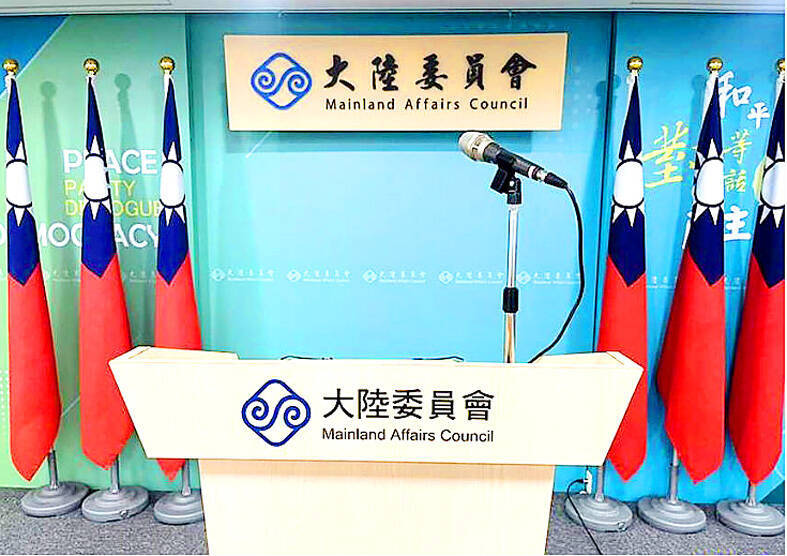The government’s position of welcoming Chinese tourists remains unchanged, the Mainland Affairs Council said yesterday, following Shanghai Deputy Mayor Hua Yuan’s (華源) comments that the city administration would promote group tours to Taiwan.
“People across the Taiwan Strait are a family. The more frequently we visit each other, the closer we become,” Hua told the participants of the annual Taipei-Shanghai Twin-City Forum in Taipei.
“I invite Taiwanese to visit Shanghai and hope Shanghainese can visit Taiwan more often. We will promote group tours to Taiwan among Shanghai residents, and travel itineraries would definitely include Taipei,” he said.

Photo: Taipei Times
Hua’s statement was perceived as a signal that China would soon allow Shanghai residents to visit Taiwan.
The Chinese Ministry of Culture and Tourism in August gave permission to residents of China’s Fujian Province to visit Kinmen and Lienchiang (Matsu) counties. Beijing still imposes a travel ban on Taiwan proper.
“We are not sure whether the Chinese Ministry of Culture and Tourism or Shanghai has the final say [in lifting the travel ban to Taiwan]. Nevertheless, the government’s position of welcoming the arrival of Chinese tourists remains unchanged,” the council said in a statement.
The council said it had on Aug. 24 announced plans of resuming cross-strait tourism, and agencies are ready to do that.
It said it is waiting for an official announcement of details from the Chinese Ministry of Culture and Tourism.
China’s Taiwan Affairs Office last month said Beijing would consider lifting the travel ban to Taiwan proper and Penghu County if the Taiwanese government lifts a ban on group tours to China and removes what it calls the barriers impeding exchanges and partnerships for people across the Taiwan Strait.
The Ministry of Transportation and Communications said that Beijing has yet to show any goodwill in terms of tourism, as more Taiwanese visit China than Chinese visiting Taiwan.
China allows its Fujian residents to visit Matsu and Kinmen individually or in groups, the Tourism Administration Director-General Chou Yung-hui (周永暉) said, adding that the administration welcomes tourists from other provinces as well.
“We continue to implement cross-strait tourism exchange in accordance with the principle of reciprocity and review the policy by taking into account the status quo,” he said.
High Quality of Travel Association public relations representative Ringo Lee (李奇嶽) said that travel operators are ready to accept Chinese tourists.
“We also hope that the government would soon lift the group tour ban to China, and in doing so the cross-strait tourism would continue to develop in a normal direction,” Lee said.
Chinese tourists used to spend about seven to eight days traveling in Taiwan, regardless of which airport they entered, he said.
While all international tourists would visit Taipei during their tours in Taiwan, a majority of them — 80 percent — would only stay in the capital, Lee said.
Chinese tourists were more likely than others to travel to tourist attractions in central, southern and eastern Taiwan, and their visits can directly help tourism in those regions, he said.
How much Taiwan would benefit from the visits of Shanghai tourists depends on the tension between Taiwan and China, Lee said, adding that more Chinese tourists would come if tensions ease.

Chinese Nationalist Party (KMT) Chairman Eric Chu (朱立倫), spokeswoman Yang Chih-yu (楊智伃) and Legislator Hsieh Lung-chieh (謝龍介) would be summoned by police for questioning for leading an illegal assembly on Thursday evening last week, Minister of the Interior Liu Shyh-fang (劉世芳) said today. The three KMT officials led an assembly outside the Taipei City Prosecutors’ Office, a restricted area where public assembly is not allowed, protesting the questioning of several KMT staff and searches of KMT headquarters and offices in a recall petition forgery case. Chu, Yang and Hsieh are all suspected of contravening the Assembly and Parade Act (集會遊行法) by holding

PRAISE: Japanese visitor Takashi Kubota said the Taiwanese temple architecture images showcased in the AI Art Gallery were the most impressive displays he saw Taiwan does not have an official pavilion at the World Expo in Osaka, Japan, because of its diplomatic predicament, but the government-backed Tech World pavilion is drawing interest with its unique recreations of works by Taiwanese artists. The pavilion features an artificial intelligence (AI)-based art gallery showcasing works of famous Taiwanese artists from the Japanese colonial period using innovative technologies. Among its main simulated displays are Eastern gouache paintings by Chen Chin (陳進), Lin Yu-shan (林玉山) and Kuo Hsueh-hu (郭雪湖), who were the three young Taiwanese painters selected for the East Asian Painting exhibition in 1927. Gouache is a water-based

Taiwan would welcome the return of Honduras as a diplomatic ally if its next president decides to make such a move, Minister of Foreign Affairs Lin Chia-lung (林佳龍) said yesterday. “Of course, we would welcome Honduras if they want to restore diplomatic ties with Taiwan after their elections,” Lin said at a meeting of the legislature’s Foreign Affairs and National Defense Committee, when asked to comment on statements made by two of the three Honduran presidential candidates during the presidential campaign in the Central American country. Taiwan is paying close attention to the region as a whole in the wake of a

OFF-TARGET: More than 30,000 participants were expected to take part in the Games next month, but only 6,550 foreign and 19,400 Taiwanese athletes have registered Taipei city councilors yesterday blasted the organizers of next month’s World Masters Games over sudden timetable and venue changes, which they said have caused thousands of participants to back out of the international sporting event, among other organizational issues. They also cited visa delays and political interference by China as reasons many foreign athletes are requesting refunds for the event, to be held from May 17 to 30. Jointly organized by the Taipei and New Taipei City governments, the games have been rocked by numerous controversies since preparations began in 2020. Taipei City Councilor Lin Yen-feng (林延鳳) said yesterday that new measures by